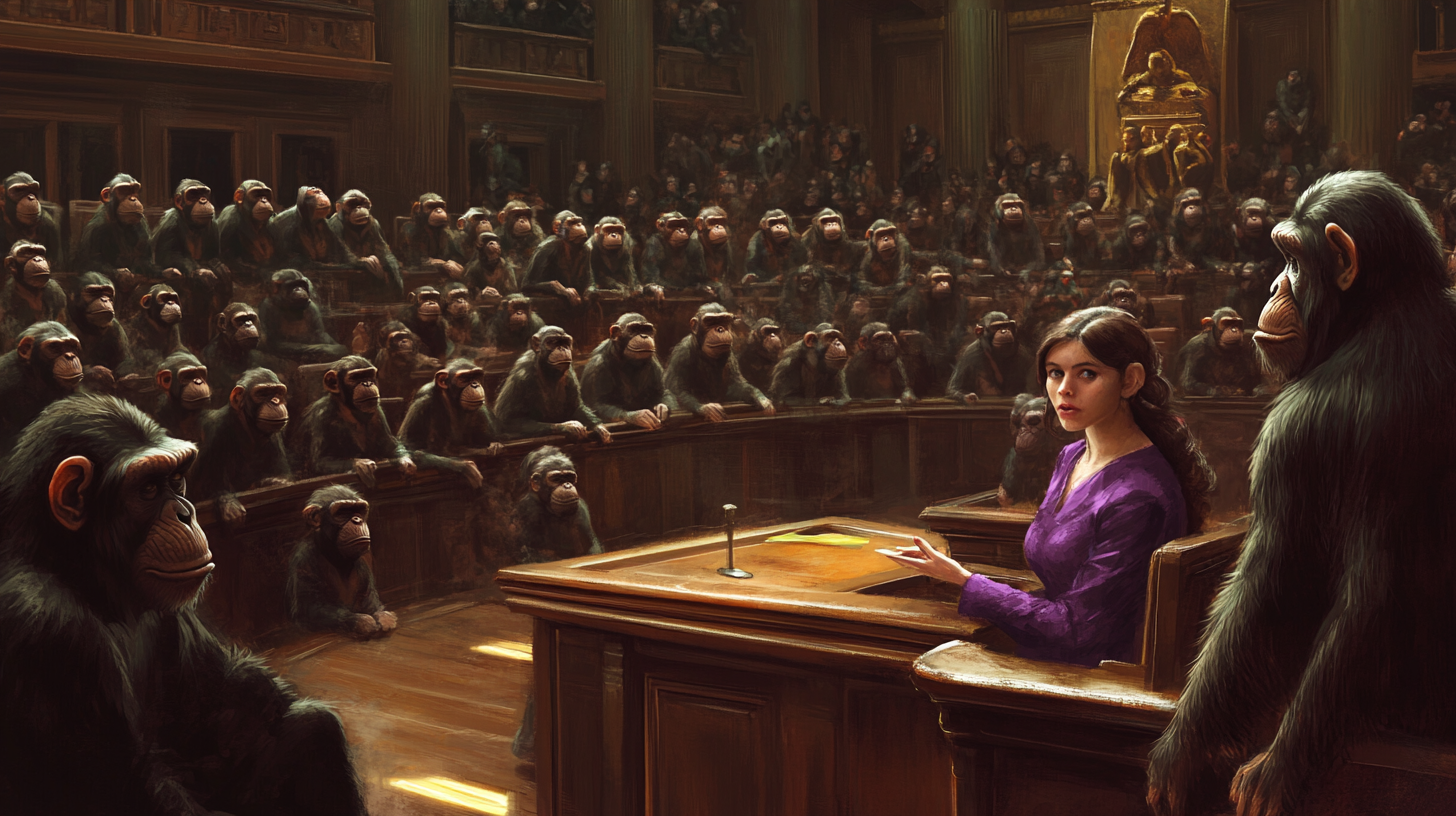Gender-Affirming Care Is the New Scopes Monkey Trial
After a hundred years, we should certainly know better

On 04 December 2024, the Supreme Court of the United States will hear oral arguments in United States vs. Skrmetti, which challenges a 2023 Tennessee law banning gender-affirming care for transgender people under the age of 18.
Skrmetti focuses on whether gender diversity should fall under the equal protection clause of the 14th Amendment to the Constitution. As written, the law forbids gender-affirming care only when administered to treat "a purported identity inconsistent with the minor's sex."
How do such discriminatory laws get enacted? I am currently consulting on a criminal case against a transgender man, and I sense an eerie parallel to another law from Tennessee - The Butler Act of 1925 - that forbade teaching evolution in state-funded schools.
When The Butler Act became law, evolution was still considered a hypothesis, and Christianity perceived an attack against its creation myths. Today, gender-affirming care is perceived as an attack against poorly-translated verses from the Bible.
In both examples, religion is used to suppress the advance of science. Not content with fire and brimstone sermons, Christian leaders preach uninformed opinions, their flocks enact uninformed legislation, and my community faces discrimination unseen since the Civil Rights Act of 1964.
As a transgender woman, I am a criminal by definition. But instead of United States vs. Skrmetti, my community deserves another State of Tennessee vs. John Thomas Scopes.
After 100 years of scientific progress, my community demands to be vindicated through the pageantry of another Scopes Monkey Trial.
The Scopes Monkey Trial
By 1925, Charles Darwin's Origin of the Species was already 66 years old. But Darwin had purposely been cagey about whether homo sapiens was the result of evolution, and the idea was cautiously rejected, especially in religious circles.
In an ironic twist, John Washington Butler admitted he didn't know anything about evolution when he introduced legislation to prevent it from being taught in schools. It took the Scopes Trial to educate Butler, at which point he wrote evolution undermined the Bible - "the foundation upon which our American Government is built."
Yet Butler was not the only person blinded by religion. William Jennings Bryan - Secretary of State for Woodrow Wilson and lifelong Democrat - hailed The Butler Act of 1925 for "saving [Tennessee] children from the poisonous influence of an unproven hypothesis."
Grandiose statements aside, when The Butler Act of 1925 passed into law, the American Civil Liberties Union (ACLU) sought an opportunity to challenge it in the name of science. In order to force a criminal case, John Thomas Scopes incriminated himself for having taught from the book (mandated by state of Tennessee) that explicitly endorsed the theory of evolution.
Scopes's trial was staged and intended merely as a publicity stunt to drive tourism to Dayton, TN. But the public was captivated by a court case in which science was put on trial by a religion rapidly losing relevance.
The Scopes Trial was a criminal case - the validity of the law could not be challenged unless a guilty verdict was handed down. And on 25 July 1925, John Thomas Scopes was found guilty of violating The Butler Act of 1925 and fined $100.
From explosion to fizzle
Although State of Tennessee vs. John Thomas Scopes was appealed in the Supreme Court of Tennessee, the remainder of its history is mundane, if horrifying.
The appeal claimed Scopes's right to free speech was limited by The Butler Act. The Supreme Court of Tennessee rejected the claim, writing Scopes was an employee of the state and subject to the limits imposed by it, including a ban on what he taught.
The appeal claimed The Butler Act did not "cherish literature and science," as the Tennessee State Constitution promised. The court wrote it could not determine what the state should cherish. That privilege lay with the legislature, and they had made their choices.
Finally, the appeal claimed The Butler Act attempted to establish a state religion, as forbidden by the Tennessee State Constitution. The court wrote no religion was given preferential treatment in prohibiting a field of education. Although some religions would object to the theory of evolution, none had done so explicitly in its liturgy.
Think about that.
The Butler Act of 1925 was not struck down. It was judged in accordance with the Tennessee State Constitution.
John Thomas Scopes was convicted, The Butler Act stood, and religion explicitly entered United States law. Within two years, the damage was evident. Another 13 states introduced legislation prohibiting the theory of evolution.
Today, as the pace of legislation introduced to limit gender-affirming care accelerates, it was The Butler Act that led the way. And why not?
The Scopes Trial proved an anti-scientific law is not necessarily an unconstitutional law.
Gender-affirming care on trial
The transgender community stands trial today for the crime of being weird. We face discrimination in education, our places of employment, finding and retaining housing, and - finally - in our state legislatures and justice systems.
But the transgender community is not criminalized because we oppose the truth of science. On the contrary, science is firmly on the side of the distinction between sex and gender.
The hate, the discrimination, and the legislation introduced to restrict our identity spring directly from religion. Specifically, from those who claim the Bible is "the foundation upon which our American Government is built."
And even then, does the Bible truly decry the LGBTQ community? The quick answer is no.
It was not until 1946 that a translation of the Bible exchanged child molestation in Leviticus 18:22 for homosexuality. Presumably, the church recognized the danger of the latter while preserving the tradition of the former among its clergy.
Labeling the LGBTQ community "an abomination," the church crusades against us not because their scripture ever directs it, but because newer translations choose hate and discrimination. Today, "the religion of love" might best be described as "a purported identity inconsistent with the religion's Golden Rule."
In less than a century since the first translation of hate, LGBTQ discrimination is entrenched in Christian thought. As such, it is being codified into United States law.
Despite overwhelming evidence that gender-affirming care is effective, religious leaders seek to limit it not based on reason, but faith.
And what about Skrmetti...?
The Scopes Trial demonstrated science could be suppressed by religion both in legislation and in a court of law. The fallout led directly to Tennessee legislation soon to be challenged by the Supreme Court of the United States.
But United States vs. Skrmetti is not about whether transgender people are real, whether we deserve recognition as humans, or whether we should be exonerated of our crime of existing. Skrmetti is about whether the Tennessee law violates the United States Constitution.
If the Tennessee law is found unconstitutional, it will be struck down. But in no way does that guarantee new laws will not rise - like a Hydra of legislation - to take its place.
Skrmetti is not a criminal case with evidence to be judged and damages to be repaired. At stake is whether gender identity is to be treated the same as sex, and viewed as a Protected Class under Federal law: in particular, Title VII of the Civil Rights Act of 1964.
Unfortunately, the Civil Rights Act used the word "sex" where it meant "gender" as the individual expression of physical, cognitive, and behavioral characteristics to be protected from discrimination. One word would have prevented Skrmetti from ever occurring.
I fear if Skrmetti formalizes the conflation of sex with gender in Federal law, it will open the door to further misunderstanding of the human experience. I fear it could make matters worse by enabling new methods by which to use religion as a weapon.
After all, Genesis 5:2 states explicitly only male and female exist. Will we outlaw intersex people? Will we outlaw transgender people who undergo gender-affirming surgery?
Again, I call not for legal machinations, but a simple legal case: should I stand trial for the crime of being transgender?
The Scopes Trial done right
The Scopes Trial was staged to challenge The Butler Act of 1925, and I want a criminal trial to challenge legislation limiting transgender expression. Given what is at stake, nothing less than national attention is necessary to bring an important distinction to light.
We need to debate not whether each individual law that limits gender diversity is in line with the Constitution, but whether religious scripture represents a valid source of truth. We need to establish whether religious scripture has the power to override science.
We need to establish that anti-scientific laws are by definition unconstitutional.
If Skrmetti results in a Supreme Court opinion that gender identity is to be a subgroup of sex as a Protected Class in Title VII of the Civil Rights Act of 1964, it is likely only to solidify the conservative rhetoric that claims the two are identical. And it is the conservative rhetoric that sex and gender and identical that leads to hate, discrimination, and legislation such as that passed by the State of Tennessee.
Next year - 2025 - is the 100th anniversary of the Scopes Trial. Western society is dependent upon science, yet gender-affirming care is being regulated based on religion in a dangerous parallel. Answer me, United States Government:
Have we learned nothing since then?




